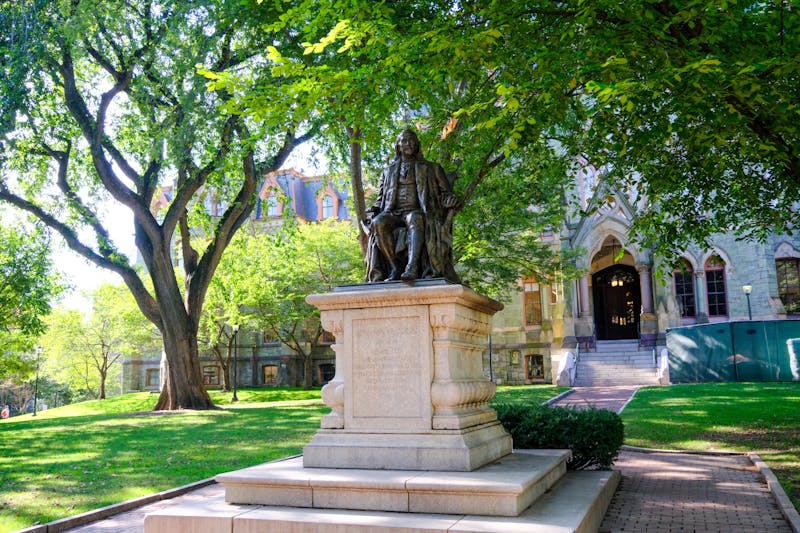
If you haven’t heard about Birthright, it sounds like fantasy: an organization that offers a free 10 day trip around Israel to thousands of young Jewish adults each year. My first thought when I heard about this program through Penn Hillel? There is definitely a catch. My second thought? I am definitely not Jewish enough for this.
Of course there was a catch. If I were writing an unequivocal endorsement of Birthright, it would belong on the organization’s website alongside a promotional hashtag and a camel selfie. Still, like many other relatively ill-prepared American tourists who sign up, I accepted the free trip without researching where the program’s funding comes from. (For the record, over a quarter of the trip is paid for by the Israeli government.)
I also conveniently set aside moral judgements until after I got my $250 deposit back, despite the harsh account of Israeli occupation in the West Bank that I’d heard from a Jewish family friend working to provide healthcare to Palestinian refugees, who described the detainment and torture of children by Israeli authorities. To be honest, I had blocked out the details of the Arab-Israeli conflict and hoped to return from the trip better informed.
I am the demographic that Birthright targets: an impressionable young adult lacking a strong attachment to or understanding of my Jewish identity. When people ask me about my religion, I answer Jewish about 95% of the time, often qualified by statements about being agnostic or about my dad’s Catholic rearing. Growing up, my family didn’t belong to a Synagogue or observe Shabbat, and I even attended a Quaker school for five years. Understandably, I always felt more comfortable emphasizing the “ish” part of being Jewish.
Before I knew it, I’d passed a mildly degrading security interview from El Al Airlines and was in Tel Aviv, surrounded by a group of Penn and NYU students animatedly debating the Boycott, Divestment, and Sanctions Movement, which has been the source of protests on the New York University campus after their student government passed a pro-BDS resolution. Although Penn has three Israel advocacy groups and one Palestinian advocacy group, their presence on a not-so-activist campus is somewhat muted by comparison.
But almost as overwhelming as the politics were the Hebrew songs, prayers, and traditions that I didn’t know quite how to participate in. As advertised, Birthright is a powerful experience for many that go – it can’t be written off as Zionist indoctrination or bible camp or a Jewish match-making service or a mystical journey. Participants can choose to mold it into any of those things. It’s a deluge of information and traveling, and for those lucky enough to get a good group and an engaging Israeli guide, the experience can be transformational – especially if, like me, you’ve never been tied to a Jewish community before or bombarded by a collective Jewish memory spanning several millennia.

File Photo
Hovering inescapably over the trip is the unsteadiness of the region, a vague feeling that this New Jersey sized country could go up in flames at any second, leaving only the 2000-year-old fortress of Masada standing. Though the trip covers a lot of ground and includes several lectures and discussions about the Israeli-Palestinian conflict, the glaring omission is a visit to the West Bank or a meeting with a Palestinian from occupied territory, experiences most Birthright trips can’t or don’t provide. Recently, anti-occupation groups like IfNotNow have encouraged American Jews to protest Birthright for the purported bias of the organization and for Israel’s human rights abuses. This suggestion has been bolstered by a growing sentiment that Birthright is out of touch with young Jews, many of whom are repelled by Israeli Prime Minister Netanyahu’s far-right government and by the Palestinian occupation.
Regardless, Birthright has a powerful presence at Penn, even sending dozens of Penn students abroad for summer fellowships and internships every year. For most Birthright participants — myself included, it is easy enough to push these ominous feelings to the sidelines during the trip enough to have fun and take full advantage of the lower drinking age. The back and forth of grief and joy — visiting Yad Vashem Holocaust Museum during the day and a pub in Jerusalem at night — creates a disorienting emotional turbulence, but this duality also a long-standing practice in Judaism.
Birthright worked on me in a major way – I’ll no longer hesitate to say that I’m Jewish, and I feel more comfortable in my own skin. At Penn, blocking out Jewish life altogether is nearly impossible, especially since about 17% of undergrads identify as Jewish, but I still managed to do it first semester. Now, home from the Holy Land, what I plan to do is ask questions, regardless of whether or not their answers lead me closer or farther from Judaism and Israel.

JULIA MITCHELL is a College and Wharton freshman from Yardley, Pa. studying International Relations. Her email address is jcmitch@wharton.upenn.edu.
The Daily Pennsylvanian is an independent, student-run newspaper. Please consider making a donation to support the coverage that shapes the University. Your generosity ensures a future of strong journalism at Penn.
Donate






